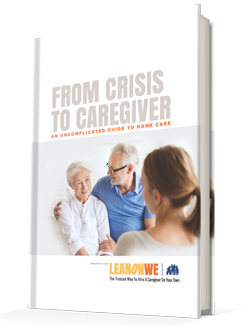How to Protect Your Senior from Financial Abuse

Is your senior safe from financial abuse? You might be surprised.
A report by elder financial services firm True Link Financial reveals that the extent of senior financial abuse is much greater than previously reported. More than one third of Americans over age 65 are affected in a given 5-year period – at a cost of $36.5 billion a year.
In this guide, we’ll share three common forms of financial abuse and how to protect your senior from them.
» Protect your senior with our free guide to home care, "From Crisis to Caregiver."
Unethical Businesses, Con Artists, and Caregivers: The Top Financial Abusers Of Seniors
True Link Financial crunched the numbers and identified three leading causes of financial abuse toward seniors.
They are:
- Financial exploitation
- Criminal fraud
- Caregiver abuse
Financial exploitation leads the pack, with $16.99 billion lost each year by seniors. Most often this is perpetrated by U.S. corporations with a recognizable brand deliberately using misleading language and social pressure to make a sale. When challenged, the companies often defend themselves by arguing that the senior consented to the payment.
Criminal fraud follows with $12.76 billion lost each year. Criminal fraud involves any explicitly illegal financial activity where the abuser conceals his identity to avoid getting caught.
One common example is the grandparent scam, in which a senior receives an urgent phone call from a “grandchild” who needs him to wire money “without telling mom or dad.” Another type of fraud, identity theft, occurs when someone opens a credit card or financial account in the senior’s name or uses an existing account without the senior’s permission.
And lastly, there is caregiver abuse. Caregiver abuse totals $6.67 billion each year and is caused by theft or deceit by a trusted caregiver, whether it be a family member or a paid caregiver. Caregiver abuse often manifests itself in someone who frequently “borrows” money or steals items from a home. They win the trust of you and your senior before taking advantage of their position.
All told, that’s $36.42 billion lost each year. Each of these three scenarios is preventable; read on for three tactics you can use to protect your loved one.
What You Can Do To Protect Your Senior: 3 Tactics
Elder financial abuse is common, but with a watchful eye, you can prevent the above scenarios.
While confusion and memory loss make seniors especially vulnerable to all types of financial abuse, you can take the following actions to reduce your parent’s risk:
- Review financial statements
- Consider any signs of vulnerability
- Reduce exposure to predators
Review Financial Statements Regularly
The first line of defense is a simple review of your senior’s financial statements to catch any irregularities or suspicious activity.
We recommend that you check your parent’s finances every few months to make you aware of any concerning changes in his spending habits. TrueLink estimates that this simple action prevents 24,500 instances of fraud – or $465 million in losses – every year.
Consider Any Loss a Sign of Vulnerability
It’s easy to shrug off a small unknown charge, but don’t. One unexpected expense here and there could be a sign of something more sinister.
Though an unexplained $25 charge on a credit card or bank statement may seem inconsequential, small losses often lead to greater ones. Gently ask your parent where the money went. Then, keep a closer eye on his financials and be ready to step in immediately if you see other trouble signs.
Reduce Exposure to Financial Predators
Lastly, limit your senior’s entry points to financial predators.
Sometimes, the best way to prevent an attack is to minimize the opportunities for one to come about. Simple tactics you can take are:
- Adding your senior’s phone number to a “do not call” list.
- Encouraging him or her not to be too friendly with strangers or callers.
- Remind them never to share financial information on the phone.
Though senior financial abuse once flew under the radar, public opinion is now strongly against anyone who preys on vulnerability for financial gain. Act quickly to limit your parent’s contact with questionable caregivers, and always report unethical companies and scams to raise awareness and make it harder for them to exploit others.
Thinking About Home Care? Download Our Free Guide “From Crisis to Caregiver”
The above tactics can help prevent a financial catastrophe for your loved one, but there’s one more step you can take: make sure that you trust who is caring for your senior.
At some point, you may need to bring in extra help. But how do you know if you are hiring the right caregiver? To help, we recommend downloading our free eBook, “From Crisis to Caregiver: An Uncomplicated Guide to Home Care.”
This eBook discusses the ins and outs of hiring a caregiver, arming you with a trustworthy resource to make the best decision for your loved one. Our eBook takes a no-nonsense look at:
- The realities of financing senior care
- Straight talk about the pros and cons of the three common home care options
- Our own stories of hiring caregivers as a way to highlight the unexpected pitfalls you’ll want to avoid
Click the button below to download the free guide and take the first step toward approaching the hiring process with confidence and peace of mind.

